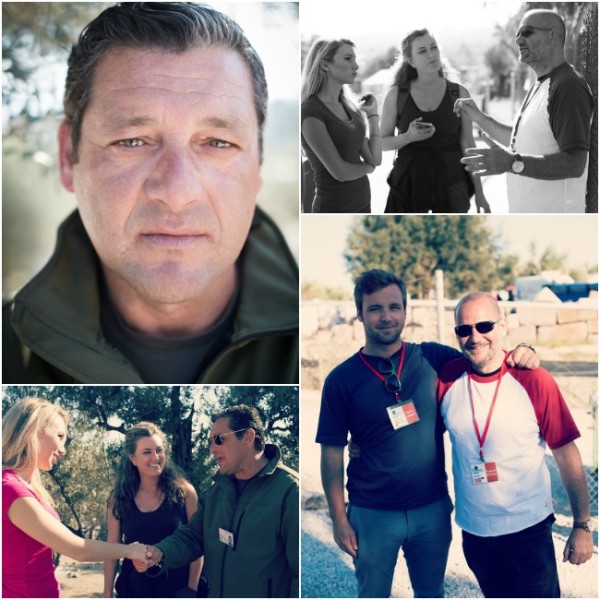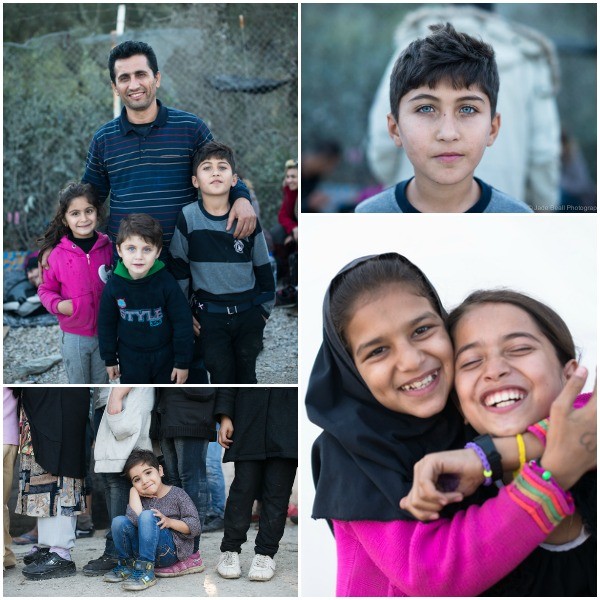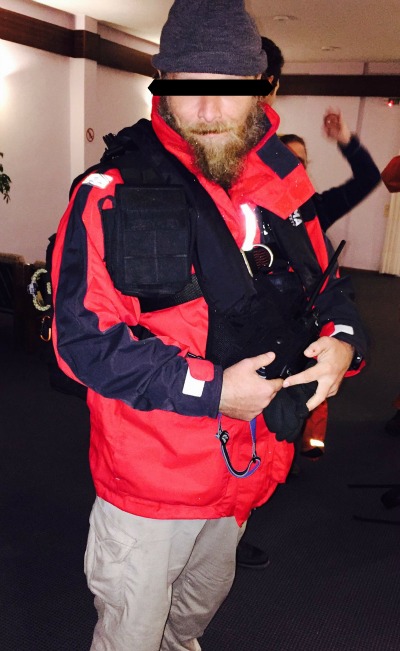My father cursed me.
I told him I was departing to assist in the Syrian refugee crisis by volunteering and gathering stories in refugee camps on the tiny island of Lesvos, Greece.
(Its 85,000 residents have hosted more than 550,000 refugees since January.)
“I think what you’re doing is irresponsible and dangerous,” my dad said. “You’ve got children to raise.”
I reminded him I wasn’t going to Syria to thrust myself betwixt Bashar al Assad (who might gas me) and ISIS (who might alleviate me of my head). I was going to Europe.
While I understood that my dad loves me and doesn’t want me to perish, I did feel he’d inadvertently hexed me. That now I would die. Because it makes sense that refugees, who are trying desperately to escape terrorists, would suddenly turn on me, a person who was trying to help them.
My first day was spent in Kara Tepe, a camp run by General Manager, Stavros Mirogiannis and Frenchman/Most-Interesting-Man-In-The-World, Fred Morlet of Volunteer’s Co-ordination Team.

I watched my back.
Anyone who looked vaguely swarthy made me nervous, which was pretty much everyone (including myself, as I hadn’t tweezed). Simultaneously, I chastised myself for Islamophobia and western privilege/assholicry.
I surprised myself by surviving the day. And not just that, I began to feel quite at home in the camp after helping with meal and clothing distribution.
I realized these people weren’t refugees their whole lives.
That, in fact, they were displaced civil engineers, physical therapists, classical guitarists, elementary school teachers and, I suspect, there was probably a blogger among them (poor chap.)
My team leader, Jamie Grumet, interviewed one young woman who’d had a treacherous journey from Syria, to Turkey and finally across the Aegean Sea into Lesvos.
Her first boat capsized.
She floated in the sea for a half hour before she was rescued by the Turkish smugglers. She had to wait for a second boat over three days, hidden in a remote forest without food, water or a fire to keep warm.
She had to wade out to the second boat, when it arrived, in waist deep water.
When she finally reached Lesvos, she’d lost everything she owned, except for the wet clothes on her back.
Jamie asked, “What would you like people to give you, if you could have anything?” and the young woman replied without hesitation, “Respect.” Then Jamie asked, “What would you like someone to buy you?” and the woman said, “Make up.”
She just wanted to be a pretty girl again. She just wanted to be normal.
By day’s end, I was certain my father’s curse had been undone. I was no longer afraid of the people I’d met in the camp. Meeting them in person changed them from a news story, an idea I had in my head, to flesh-and-blood humans, like me and the family I love. Only they were trapped in an untenable situation that tested their strength and character each and every day.
I was going to live. But would they?

That night me, Jamie and one of our photographers, code-name The Russian (for her immunity to vodka), had dinner in Mytilini then jumped into our shoe-skate, stick-shift rental car to drive the terrorizing switchbacks over a pitch-black mountain on the 90-minute trek to our hotel in Molyvos.
Because Jamie couldn’t drive stick, and The Russian had tippled some vodka and was asleep in the backseat before her butt hit the upholstery, I decided to drive.
Quelle horreur!
I hadn’t driven stick in twenty-five years, and I’d apparently come down with a rampant case of Night-Vision Blindness. I couldn’t see a thing!
When did this happen? Was I suddenly struck with stress-related Hysterical Blindness?Had I caught Macular Degeneration from my eighty-five year old mother-in-law before I left?
Did I have the wet kind or the dry kind? And which one is worse? Oh why, why, why did my father curse me?
“Jamie, Jamie! Can you please find the brights?” I begged, after scrabbling my hands all over the dashboard in search of them, almost catapulting us down a sheer 500-foot drop.
Jamie found the brights in one, casual click (no one had cursed her) then asked if I’d like her to play music from her iPhone so I wouldn’t fall asleep.
I agreed, then instantly regretted it, because we had no speakers and the music was a high-pitched, shrieky noise that pierced the epicenter of my cerebellum like an ice pick in a Bond movie.
Cars sped up behind me, flashing their lights and honking.
What was their fucking problem? I was doing at least fifteen miles per hour!
I tried to go faster, heart pounding, eyes squinting as several cars whizzed past me on blindman’s curves. It occurred to me that my father’s curse had nothing to do with the Syrian refugee crisis. That perhaps my end would come as I drove this tin-can car over a cliff, because I’d inexplicably become Mister Magoo?
I wondered what they’d say about me at my funeral? And how many people would show up? What if I had a bad turnout? What if it was only my immediate family, minus my father who’d boycott my funeral because he told me so?
What have I done with my life? I still have so much left to prove!
Jamie’s music track changed to a Tupac Shakur ditty that goes something like this, “Mother f–ker, mother f–ker, n-word n-word, blow me, suck a d–k …” and so forth.
“Jamie, can you turn that off?”
She was asleep, my hands flailed about trying to find the iphone to turn it off, I almost drove straight into the mountain when suddenly The Russian sat straight up in the backseat. “Are you okay?” she queried as if she’d been awake the entire time. As if she hadn’t just a split second ago been in a deep, snoring REM cycle. As if she were awake and exactly alert enough to be right in the middle of performing brain surgery on the woman who would cure cancer.
“I’m fine,” I lied, because I didn’t want her to drive. Haven’t I told my daughters never to get into a car with someone who’s been drinking?
“Do you need me to talk to you so you can stay awake?”
“Sure.”
This is what I heard: Tupac: “Mother f–ker, n-word, c-word, booty, motherf–ker.”
The Russian:
“And then there’s the vortex of art, where all things collide in their humanity and the osmosis of the intimacy and the vulnerability intersect in the vortex and then …”
Tupac: “motherf–king bitch, n-word, c-word and …”
Suddenly, I had to vomit. I was driving yet had managed to get car sick.
It was the night vision blindness. I had to pull over as The Russian and Tupac asked how I was doing and was it their fault that I was puking on the side of the road? And …
Forget ISIS, forget Assad, I was going to die when a car ran me over as I was barfing on the side of the road on a small island in Greece, the most neurotic volunteer to arrive from any locale.
I survived the drive, but the following night, after the Paris tragedies occured and all of us were on edge, a boat in Molyvos Harbor exploded just one mile from our hotel. I panicked. Because in that moment it made perfect sense that after Paris I was the next logical target-rich territory for ISIS.
As I was pondering flying home that second, this gentleman swashbuckled into the hotel lobby from performing sea rescues.

When I mentioned my safety concerns and my father’s curse, he told me I just had to have the will to live and I would live.
As a medic with Doctors Without Borders, he’d just returned from spending a month in cave 129 in Afghanistan living with and treating the Taliban.
As ex-special forces he informed me he’d been shot once, stabbed three times, drowned once, had cancer and was still alive. This made me feel like a candy-ass chicken-shit fool. I decided to live, and survived the entire trip.
More importantly, I had the privilege of meeting some of the most amazing people I’ve met in my life. Individuals we call refugees and tireless volunteers who’ve witnessed countless tragedies and brought many people back from the brink.
One NGO aide group is called A Drop in The Ocean, because the volunteers there know there’s an ocean of need that they can’t possibly address, but for the few people they manage to save, they’ve made a massive difference.
Now I’m off to twist my dad’s arm to make his donation, because I broke the curse!!
If you want to follow all of my stories of the Syrian refugee crisis from Lesvos opt-in to my bi-weekly newsletter HERE.

12 thoughts on “I Was Told Not to Help Syrian Refugees”
I went to El Salvador during the civil war with a church group. My father said approximately the same thing. I think it’s a “dad” thing. Thank you for being witness and telling their stories.
Stephanie that sounds incredible! I’ve yet to go to South America which I really need to do as I actually speak passable Spanish.
For all of us who watch from afar clutching our hearts, thank you.
Lisa xoxo
I still can’t believe you did this. I’m so glad your father’s curse didn’t work but I so get (and sorta miss) father’s curses.
What Lisa said.
Hi Pia — it was such a good experience and it’s a bit weird to be home where I don’t feel quite as useful. I think I’d like to do some kind of volunteer work at least once a year and maybe take the whole family when my girls are in high school. And I guess I do need to cut my dad some slack, I’d probably say the same thing to my kids if I thought there was danger. xo
You rock Shannon! I’m so impressed you did this. Lots of people think about things, but you actually did it!
Thanks for taking the time to read CeeCee!
Shannon I loved this post!!! This is the first thing I’ve read that has really given me the perspective of the Syrian people behind the word “refugees”. In Aust refugees are given the generic term “boat people” – and once they are labelled we forget that they were all the things you describe before they ended up with a label that creates a barrier between “us” and “them”. In a world where we’re constantly exposed to bad news and tragic events outside our control it’s easy to stop listening (reading) and recognising what is happening to these people. I loved that you still managed to get your trademark humour in as well in a way that didn’t diminish the overwhelming sadness of these stories. Well done.
I don’t understand why the media always has to focus on the negative and fan the flames of our fear. It’s so counter-productive. And thanks for all of your kind compliments. We readers need them. Along with our gin and tonic.
Amazing story, very inspiring, filled with humor and realities at the same time. Thank you for opening my eyes to another part of the world and it’s struggles.
Comments are closed.